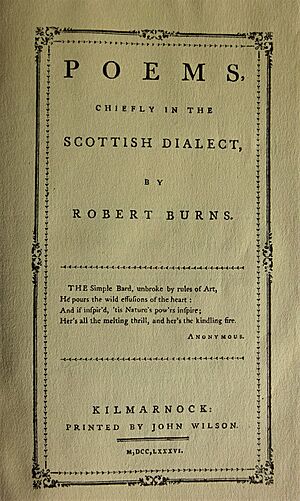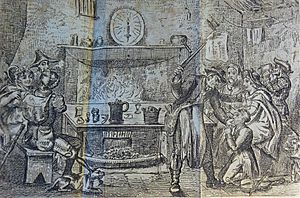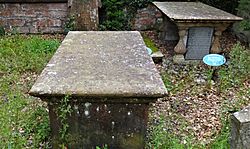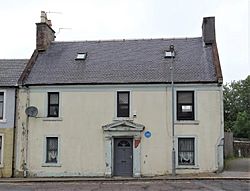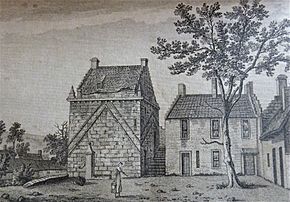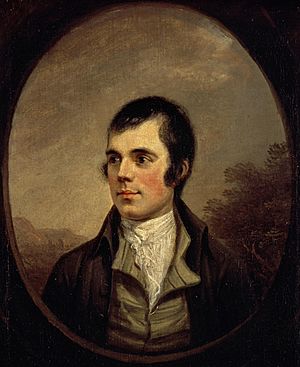John Richmond (lawyer) facts for kids
Quick facts for kids
John Richmond
|
|
|---|---|
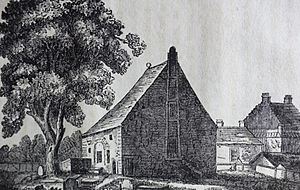
Mauchline Kirk as it appeared at the time of John Richmond
|
|
| Born | 1765 Sorn parish
|
| Died | 1846 Mauchline, Scotland
|
| Occupation | Writer or Lawyer |
John Richmond (1765–1846) was a very close friend of the famous Scottish poet Robert Burns. He was born in 1765 in a place called Montgarswood, within the Sorn area of Ayrshire, Scotland. John's father, Henry Richmond, was a merchant in Mauchline and owned Montgarswood Farm. This farm later went to John's brother, James.
John Richmond became a writer or lawyer in Mauchline. For a while, he worked as a clerk for Gavin Hamilton, who was also a good friend of Robert Burns. He also worked for a lawyer in Edinburgh named William Wilson.
Contents
John Richmond's Life
John Richmond was the younger son in his family. He went to school in Newmilns, where he lived with family friends. He married Jenny or Janet Surgeoner in Mauchline on August 5, 1791.
In November 1785, John took a job in Edinburgh with William Wilson, a lawyer. Robert Burns was not happy about this move. Burns once wrote that John was "a son of Misfortune" and was worried about his health.
After William Wilson passed away in July 1787, John soon returned to Mauchline. By September 7, 1787, he was working as a lawyer in the town.
John and Jenny lived at 3 High Street in Mauchline, a house that is still there today. John Richmond passed away in 1846 at the age of 82. He was buried in the Mauchline churchyard.
His Friendship with Robert Burns
Robert Burns likely first met John Richmond in 1784. At that time, John was working as a clerk in Gavin Hamilton's law office.
Richmond introduced Burns to another friend, James Smith. Along with William Hunter, a tanner, these four became very close friends. They formed a group called the 'Court of Equity' at the Whitefoord Arms pub. Burns wrote a poem about this group called "Libel Summons, The Fornicator's Court or The Court of Equity".
In this playful court, Burns was the 'Perpetual President'. James Smith was the 'Pocurator Fiscal', William Hunter was the 'Messenger at Arms', and Richmond was the 'Clerk of the Court'. They would meet to talk about village gossip and what punishments different "crimes" deserved. Burns even received a mock-summons to appear before this court.
Richmond, Smith, and Burns often met after work. They would visit the reading club at Loudoun Inn, discuss politics, or attend a debating society. Burns would sometimes send his poems to Richmond for him to read and share his thoughts.
Richmond, Smith, and Burns are believed to have been at Poosie Nancie's Inn in Mauchline. There, they saw a group of beggars having a lively time. This scene inspired Burns to write his famous poem Love and Liberty, also known as The Jolly Beggars. Richmond later shared that early versions of this poem had three extra characters.
Richmond also shared the story that Burns's poem Address to a Haggis was first read aloud in 1785. This happened at the 'Haggis Club' in the home of David Shaw, a lawyer in Kilmarnock. The full poem was printed in a newspaper, the Caledonian Mercury, on December 20, 1786. This was the first time a poem by Robert Burns appeared in a newspaper. Richmond also mentioned that haggis was a new and interesting food at that time.
When Burns first arrived in Edinburgh on November 28, 1786, he had arranged to share a room with Richmond. They stayed in Mrs Carfrae's flat at the Lawnmarket. They shared the rent and had a simple room with a bed, a sanded floor, and a table.
When Burns first came to Edinburgh, he was not feeling well. He spent a lot of time in bed, and Richmond would read to him until he fell asleep. Richmond also helped Burns write down his poems and songs to get them ready for publishing.
Some stories say that Burns and Richmond argued, and Burns left the flat. However, friendly letters from that time suggest otherwise. Burns might have simply moved to a better place or was planning his trip to the Highlands. Richmond said that for the year they lived together, Burns was very careful about his habits.
Burns sent Richmond a copy of his 'Kilmarnock Burns' book. He told him, "you must bind it in the neatest manner and never lend it, but keep it for my sake." This was a very kind gesture of friendship, especially since Burns did not have many copies of the book.
Burns also gave Richmond a special silver-mounted snuffbox. This box was made from wood taken from the roof of the old Auld Alloway Kirk. The snuffbox had a poem carved into it:
|
"Frae the oak that bare the riggin', |
This special item was later given to the Municipal Museum in Edinburgh.
Letters from Robert Burns
In February 1786, Burns wrote to Richmond, saying that his main supporter was Mr. Aiken in Ayr, who liked his poems very much. Burns also mentioned he had "very important news" about himself, which he would share later.
On July 9, 1786, Burns told Richmond that he had visited Jean Armour. He said he was not looking to get back together with her, but just wanted to check on her health. He also mentioned that he might get a certificate saying he was a single man if he followed church rules.
On July 30, 1786, Burns wrote to Richmond from a place called Old Rome Foord. Burns was hiding because Jean Armour's father, James Armour, had a warrant for his arrest due to Jean's pregnancy. Burns wrote, "My hour is now come. You and I will never meet in Britain more." He planned to go to Jamaica. He also mentioned that Armour had a warrant to put him in jail unless he could pay a large sum of money.
On September 1, 1786, Burns wrote that he was upset with how Richmond had treated Jenny. He said, "I saw Jenny Surgeoner of late, and she complains bitterly against you. You are acting very wrong, My friend; her happiness or misery is bound up in your affection or unkindness." He urged Richmond to be honorable.
By September 1, Burns also felt that the arrest warrant might not be used. He had missed his first ship to Jamaica and planned to take another.
Jean Armour gave birth to twins on September 3, 1786. Burns wrote to Richmond, "Wish me luck, dear Richmond! Armour has just brought me a fine boy and girl at one throw. God bless the little dears!"
On September 27, 1786, Burns wrote that he might publish a second edition of his book. If he did, it would keep him in the country longer. If not, he would leave after the harvest.
On February 7, 1787, Burns wrote from Edinburgh that he was still recovering from a bruised knee. He said, "A lame Poet is unlucky; lame verses is an every day circumstance." He also mentioned that he had heard sad news about Jean.
On July 7, 1787, Burns wrote about his travels. He said he had been "rambling over by Dumbarton and Inverary" and had a "drunken race" near Loch Lomond. He fell off his horse and got many bruises, which would delay his trip to Edinburgh for about four weeks.
On October 25, 1787, Burns wrote a letter to Richmond, who was back home in Mauchline. Burns asked about Richmond's well-being and his "little girl." He also asked for news about Jean Armour's family and if people were talking about her.
Richmond's daughter later said that she used strips of Burns's letters as bookmarks in her school books.
A letter from October 1787 shows that Richmond helped John Lapraik find people to subscribe to his book of poems.
Images for kids
See also
- Robert Aiken
- Jean Armour
- Lesley Baillie
- John Ballantine
- Alison Begbie
- Nelly Blair
- Isabella Burns
- May Cameron
- Mary Campbell (Highland Mary)
- Jenny Clow
- Gavin Hamilton (lawyer)
- Helen Hyslop
- Nelly Kilpatrick
- Jessie Lewars
- Anne Rankine
- Isabella Steven
- Peggy Thompson
- James Smith (draper)
- John Murdoch (teacher)


